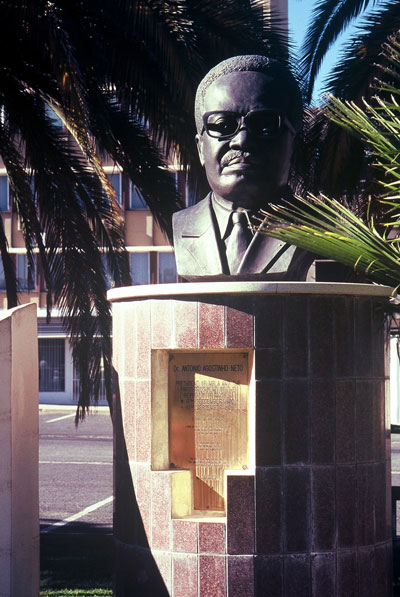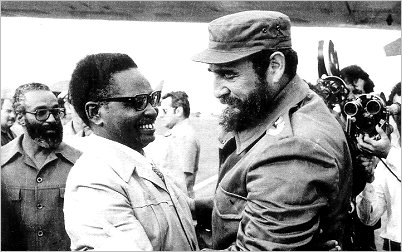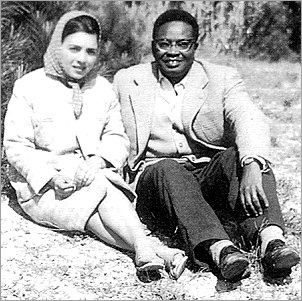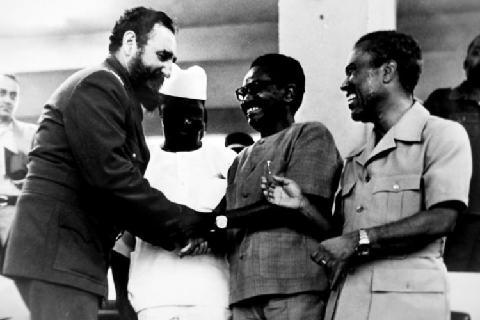<Back to Index>
- Mathematician Hans Freudenthal, 1905
- Dramatist Guillaume Victor Émile Augier, 1820
- 1st President of Angola António Agostinho Neto, 1922
PAGE SPONSOR
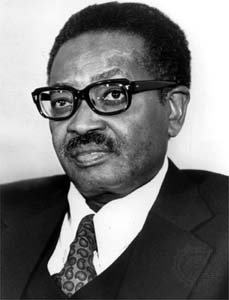
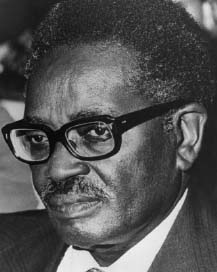
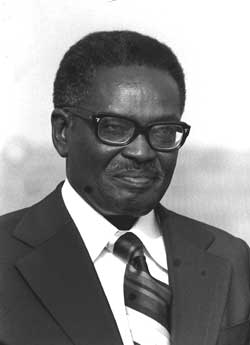
António Agostinho Neto (September 17, 1922 – September 10, 1979) served as the first President of Angola (1975 – 1979), leading the Popular Movement for the Liberation of Angola (MPLA) in the war for independence and the civil war. His birthday is celebrated as National Heroes Day, a public holiday in Angola.
Born at Catete in Bengo Province, Angola, in 1922, Neto attended high school in the capital city, Luanda; his father, also called Agostinho Neto, was a Methodist pastor. The younger Neto left Angola for Portugal, and studied medicine at the universities of Coimbra and Lisbon. He combined his academic life with covert political activity of a revolutionary sort; and PIDE, the security police force of Portuguese Prime Minister Salazar, arrested him in 1951 for his separatist activism. Seven years later he was released from prison, and he finished his studies, marrying Maria Eugénia da Silva the same day he graduated. He returned to Angola in 1959.
In December 1956 the Angolan Communist Party (PCA) merged with the Party of the United Struggle for Africans in Angola (PLUA) to form the Popular Movement for the Liberation of Angola with Viriato da Cruz, the President of the PCA, as Secretary General and Neto as President.
The Portuguese authorities in Angola arrested Neto on June 8, 1960. His patients and supporters marched for his release from Bengo to Catete, but were stopped when Portuguese soldiers shot at them, killing 30 and wounding 200 in what became known as the Massacre of Icolo e Bengo. At first Portugal's government exiled Neto to Cape Verde. Then, once more, he was sent to jail in Lisbon. After international protests were made to Salazar's administration urging Neto's release, Neto was freed from prison and put under house arrest. From this he escaped, going first to Morocco and then to Zaire.
In 1962 Neto visited Washington D.C. and asked the Kennedy administration for aid in his war against Portugal. The U.S. government turned him down, choosing instead to support Holden Roberto's comparatively anti-Communist FNLA.
Neto met Che Guevara in 1965 and began receiving support from Cuba. He visited Havana many times, and he and Fidel Castro shared similar ideological views.
Following the Carnation Revolution in Portugal during April 1974 (which deposed Salazar's successor Marcelo Caetano), three political factions vied for Angolan power. One of the three was the MPLA, to which Neto belonged. On November 11, 1975, Angola achieved full independence from the Portuguese, and Neto became the nation's ruler. His government developed close links with the Soviet Union and other nations in the Eastern bloc and other Communist states, particularly Cuba, which aided the MPLA considerably in its war with the FNLA, UNITA and South Africa.
Neto died in a hospital in Moscow, while undergoing surgery for cancer, shortly before his 57th birthday. Jose Eduardo dos Santos succeeded him as president. But the Angolan civil war continued to rage for almost a quarter of a century more. The Soviet Union awarded Neto the Lenin Peace Prize for 1975 - 76. The main university in Angola, the Agostinho Neto University, is named after him. A poem by Chinua Achebe entitled Agostinho Neto was written in his honor. An airport in Santo Antão, Cape Verde, is named after him, due to the beloved work he performed there as a doctor. There is also a morna dedicated to him. A street in New Belgrade in Serbia is named after him, the Dr. Agostina Neta street. In
1973 when Neto visited Bulgaria in one of his few unofficial visit to
this country he met a woman with whom he also had a daughter called
Mihaela Marinova. Unfortunately Neto's sudden death did no favor for
his daughter who had been raised in the orphanages in Bulgaria. The
Neto's family is yet still to recognise the child.
